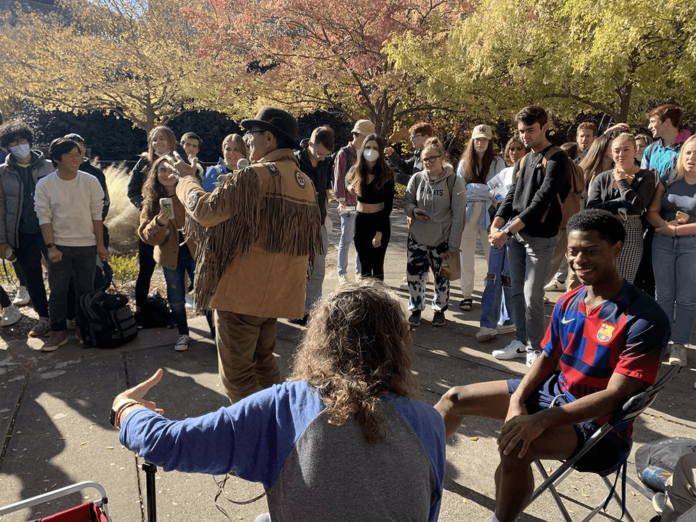
Editor’s note: This story contains sexual references and language that may be harmful to members of the LGBTQ+ community. Reader discretion is advised.
Cindy Smock, known as Sister Cindy on social media, and her husband Jed Smock preached “be a ho no mo” and other controversial topics Tuesday next to the Bryan Center parking lot.
The Smocks travel the country visiting college campuses with their organization Campus Ministry USA, which is based in Indiana and which Brother Jed founded about 40 years ago. Their mission is to bring about the “honomo revolution,” evangelizing university students by preaching from the Bible and answering questions regarding the LGBTQ+ community, God, sexual activity, mental health and more.
The couple is relatively infamous on social media. As of Nov. 16, Cindy had 336 thousand followers on TikTok and just over 10 thousand followers on Instagram.
In an interview with The Chronicle, Cindy said that in the last five decades she’s been preaching, she and her husband have always attracted good-sized crowds on campuses, but numbers were down in 2020 and the beginning of 2021 due to COVID-19. However, in March 2021 she became viral on TikTok, and college students started flocking to their talks.
Duke is not in the pair’s “regular circuit.” According to Cindy, Jed used to come to North Carolina every year and had visited Duke before, but in recent years, neither of them have come this far east since there are “so many campuses to get to.” Normally, they begin in Florida, hit all the major campuses until they arrive in California, then make their way back east and further north.
In a Newsweek article, Cindy said she was a “bad girl at the University of Florida” but was later reformed and has now preached at colleges for five decades. However, despite their evangelical teachings, the pair have faced a large amount of controversy for their vulgar and sexual language.
Cindy and Jed visited the University of North Carolina-Chapel Hill on Monday, and on Tuesday, the pair situated themselves at the turnaround of the Bryan Center parking lot. Shortly after their arrival at noon, a small crowd had gathered, later growing to over 150 students.
Answering student questions
Cindy and Jed alternated speaking from noon to 4 p.m., one taking a break while the other answered questions from the crowd.
Students were able to ask questions by raising their hands in the circle or using a provided microphone connected to a speaker. Many questions were asked with the intent of a humorous response and received cheers or laughs when answered.
Cindy used vulgar rhetoric throughout her speech, claiming that men shouldn’t bring women to Mexican restaurants on a date because margaritas would lead to sexual intercourse. Brother Jed espoused homophobic dialogue while he spoke to the crowd.
Get The Chronicle straight to your inbox
Signup for our editorially curated, weekly newsletter. Cancel at any time.
“Once you turn gay it makes it much more difficult for God to reach you,” Jed said. “It’s not unnatural, but it is unspiritual.”
Cindy’s mindset towards the LGBTQ+ community was different, as her priority was stopping premarital sex of any kind.
Despite the Smocks’ efforts to mention the Bible throughout each answer, students acted far from serious. One stood on a chair and began to fake cry, and some asked irrelevant questions, such as if they preferred a Kanye West album over a Drake album. However, the couple was not fazed and continued their evangelism for the four-hour period.
When asked if she was fazed by student mockery, Cindy said that she and Jed don’t take the mocking personally and believe their refusal to do so is a testament to the gospel and their faith.
Duke’s responses
In a message to The Chronicle Tuesday evening, junior Zoe Koutas expressed concerns that the Smocks were allowed to speak on campus for such a long period of time. She shared with The Chronicle an email she sent to the Center for Sexual and Gender Diversity, whose office is located in the Bryan Center.
“I am appalled that Duke allowed these things to be said about 100 feet away from the CSGD,” Koutas wrote in her email to the Center. “While I would like to think that the students there were only listening to make fun of them, I can’t be certain and that is incredibly upsetting.”
Koutas also wrote that she wished someone from the University had intervened, and that “hate speech, even if taken in a comedic way, has massive effects on both the groups it targets and those it doesn’t.”
Koutas also shared the response she received from Angel Collie, interim director of the CSGD.
“I am horrified of the events that took place so close to campus and so close to the CSGD. Your concerns are valid and you name many reasons the rhetoric is harmful and evokes a history of religious and spiritual violence directed towards LGBTQIA+ people and communities,” Collie wrote.
Collie also wrote that Dean of Students John Blackshear and others eventually intervened.
“The words and ideas being expressed from these individuals are in no way reflective of Duke’s commitment to being a welcoming and inclusive campus. Our non-discrimination policies explicitly name sexual orientation, gender identity and gender expression and that means something,” Collie wrote. “As a trans person of faith myself, I know what weight these messages can hold, and I am thankful for Dean Blackshear and others for intervening as soon as they learned of the incident.”
When asked if he had intervened, Blackshear wrote in an email to The Chronicle that he was working Tuesday and didn’t know much about the event.
Mike Schoenfeld, vice president for public affairs & government relations and chief communications officer, said that the University administration was aware of the event and had no further comment.
Nadia Bey contributed reporting.
Alison Korn is a Pratt sophomore and a features managing editor of The Chronicle’s 117th volume.







